Superhero films are the center of pop-culture cinema currently; they are the top grossing movies at the box office, continuously taking audiences and theaters by storm, but why are these fantasy-driven, action-packed films the center of the Hollywood? Is it the luxury of seeing men jump off buildings in tights? Or is it the pleasure of watching independent women figures take down powerful forces? I think it is the way these films are not only gripping with the technical CGI effects but also how they are able to approach cultural and societal issues without the audiences ever consciously relating them to the real-world problems, especially in Avengers: Infinity War (dir. Anthony and Joe Russo, 2018).
The action jammed into these movies and franchises teleports viewers into alternative universes where monuments things happens to the characters but keeps the audience safe and sound– in reality, the audience is at stakes with the same threats on a smaller, less catastrophic scale. For instance: Black Panther (2018) and the X-men (2000-14) franchise depicts minorities in key, influential leading roles referring to the challenges of racism:The Dark Knight Rises (2012) addresses the constant threat of terrorism and the fear recent events inflicted in the United States: Salt (2010) and Wonder Woman (2017) display a woman playing an intellectual and powerful figure whom has agency to uphold her moral obligations. There is more to superhero-action films than just the stunning effects and elaborate fight scenes, even if it is not what typical audiences enjoy.
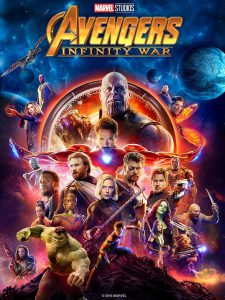
The Avengers: Infinity War movie posters.
With the name production name Marvel attached to any film in this era, the movie is going to draw an immense amount of attention at the box office. The film had an estimated budget of $316-400 million, making it one of the most expensive films ever made. The budget paid off, making over 2 billion world-wide, only the fourth film ever and the first superhero film. Alone, Chris Evans (Captain America) and Chris Hemsworth (Thor) made 15 million each for reprising their roles. With a massive; high-profile cast, the next film in the franchise is undoubtedly able to achieve equal success.
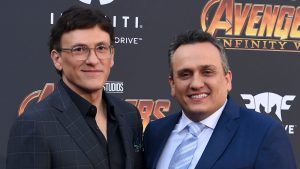
Directors, Joe and Anthony Russo.
In Avengers: Infinity War, the antagonist, Thanos (Josh Brolin), projects his ideal of “a perfect universe” onto the opposing characters, in which that this theory can only be accomplished with half the population of the entire universe perishes. As always, action film stakes are tremendously high by using universal corruption as a driving force of the plot. Thanos represents a dictator whom chooses to use characters to achieve his goal while being tangled in the ropes of surrounding plots of the film, such as his daughter. His physical force and intellectual portrayal of an ideal utopian society helps him fulfill his goal and accomplish something that will cost great sacrifice for not only those around him but also himself. What audiences never register about Thanos is the daunting parallel to the history of dictatorship that the world has experienced; this makes Thanos ultimately more unstoppable because this person in power is strikingly similar to what society has experienced before– like Adolph Hitler, Joseph Stalin, and Kim Jong-un. Thanos represents more than just an evil presence that the Avengers fear and must defeat to prevent world destruction, he directly correlates to the indomitable leaders who created wrecking of entire societies.
On another note, Bruce Banner/Hulk (Mark Ruffalo) experiences difficulties trying to either turn into Hulk when he is Banner or visa-versa (also a problem in Thor: Ragnarok). It is comical to the plot but resonates to middle-aged men viewers going through some sort of a mid-life crisis. Some go as far to say that it is a man who is failing to achieve an erection and is frustrated with himself. In the film, Banner says, ”Me and the Hulk aren’t really on speaking terms,” only proving the mid-age crisis with the afflicting personae of Banner.
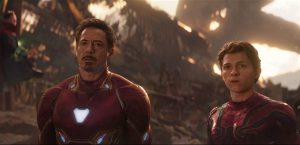
Tony Stark (Iron Man) and Peter Parker (Spider-Man).

Bruce Banner (Hulk).
Thanos’ role in film isn’t the only relatable role audiences have seen in society. The relation between Iron Man/Tony Stark (Robert Downey Jr.) and Spider-Man/Peter Parker (Tom Holland) display a reprimanding father and a disobedient son. Even though their father/son bond is more explicitly shown in Spider-Man: Homecoming (2017) where Parker is introduced as an apprentice Avenger, they face a less threatening antagonist. Their relationship carries over into Avengers: Infinity War on a smaller, more comical relief. Moviegoers can watch the two interact and understand their emotional bond because most have a relationship they are able to compare it too. A big part of the film’s success was the addition to having a crossover between the Avengers franchise with the Guardians of the Galaxy (2014-2017) and using it as a plot point. The leading woman of the franchise, Gamora (Zoe Sandala), is reveal to be the daughter of Thanos– whom she is also trying to defeat. This also makes for a relatable relationship, but a much more dysfunctional a toxic one.
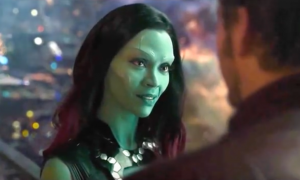
Gamora, from the Guardians of the Galaxy cast.
Sacrifice and emotional loss are the main themes conveyed in the film and is relevant to every character. Everyone is at stake to lose something or has already lost something. All relationships are torn in some way, making this a very emotionally inclined action film. Yes, sometimes you’re able to entertain an audience purely through fight and chases sequences; this film goes further to include multiple action scenes and pulling at the audiences’ heart strings– captivating all audiences whether they are action junkies or hopeless romantics.

Natasha Romanoff (Black Widow).

Wanda Maxinoff (Scarlet Witch).
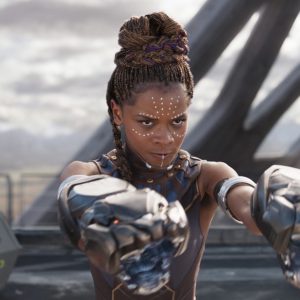
Shuri of Wakanda, T’challa’s sister.
The feminine presences displayed in these films consists of strong-willed, deceptive, intelligent badass women like Black Widow/Natasha Romanoff (Scarlett Johannson), Shuri (Letitia Wright) and Wanda Maxinoff/Scarlet Witch (Elizabeth Olsen). However, the big question is out of the 23 movies Marvel has released, why hasn’t one solely starred a woman protagonist? Marvel films display women in these fantastic supporting roles but only as a supporting character. Marvel tends to focus on the male body and portray masculine themes and suggests that women are allowed to be badass, but not badass enough to have an entire film about them. Ironically, Alien (1979) is referred to by Spider-Man in one of the scenes. Alien was the driving force of women playing key, leading roles in action films– so why does Marvel relate to such an iconic action film when they aren’t able to apply the same concepts of independent, feminine characters to their own movies and franchises?
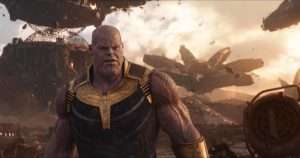
Thanos (Josh Brolin) on Titan.
Without the spectacular CGI effects that composes much of the film, Avengers: Infinity War would not have been nearly as big of a hit. This goes for all Marvel films: Thor Ragnarok (2017), Spider-Man Homecoming (2017), Dr. Strange (2016), Black Panther (2018), Iron Man (2008), Ant-Man (2015) and Captain America: The First Avenger (2011). It seems each Marvel film that is released, the effects are better than the last, pushing virtual reality to the edge and deceiving the audiences to think they are a part of this fictional universe. Avengers: Infinity War is probably the most digitally composed film with several settings the characters’ travel to like Wakanda, Planet Asgard, Planet Knowwhere, New York, Edinburgh, Planet Nidavellir, Planet Vormir, and Planet Titan.
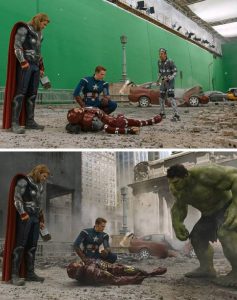
Green-screening in Avengers and CGI.
Superhero films are going to continue to dominate in the action-adventure genre as long as cinephiles continue to obsess over these adaptations of the comics. The beautiful CGI and action sequences enchant the viewers. Avengers: Infinity War expresses dark tones and themes that are unexpected but work in the film’s favor by interchanging its fictional story with reality and adding a dynamic layer to the emotion felt by all characters. There is no telling if women are going to play major roles in an upcoming Marvel film, but I think it would highly be profitable for their masculine reputation.

Recent Comments